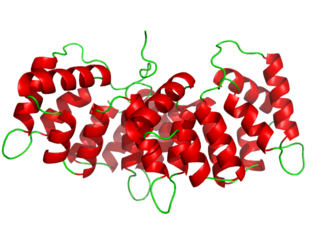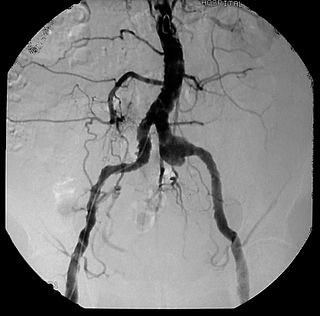
Aspirin, also known as acetylsalicylic acid (ASA), is a medication used to reduce pain, fever, or inflammation. Specific inflammatory conditions which aspirin is used to treat include Kawasaki disease, pericarditis, and rheumatic fever.

C-reactive protein (CRP) is an annular (ring-shaped) pentameric protein found in blood plasma, whose circulating concentrations rise in response to inflammation. It is an acute-phase protein of hepatic origin that increases following interleukin-6 secretion by macrophages and T cells. Its physiological role is to bind to lysophosphatidylcholine expressed on the surface of dead or dying cells in order to activate the complement system via C1q.

Diclofenac, sold under the brand name Voltaren among others, is a nonsteroidal anti-inflammatory drug (NSAID) used to treat pain and inflammatory diseases such as gout. It is taken by mouth, rectally in a suppository, used by injection, or applied to the skin. Improvements in pain last for as much as eight hours. It is also available in combination with misoprostol in an effort to decrease stomach problems.

Naproxen, sold under the brand name Aleve or Apronax among others, is a nonsteroidal anti-inflammatory drug (NSAID) used to treat pain, menstrual cramps, inflammatory diseases such as rheumatoid arthritis, gout and fever. It is taken orally. It is available in immediate and delayed release formulations. Onset of effects is within an hour and last for up to twelve hours.

Cardiovascular disease (CVD) is a class of diseases that involve the heart or blood vessels. CVD includes coronary artery diseases (CAD) such as angina and myocardial infarction. Other CVDs include stroke, heart failure, hypertensive heart disease, rheumatic heart disease, cardiomyopathy, abnormal heart rhythms, congenital heart disease, valvular heart disease, carditis, aortic aneurysms, peripheral artery disease, thromboembolic disease, and venous thrombosis.

Annexin is a common name for a group of cellular proteins. They are mostly found in eukaryotic organisms.

Paul M. Ridker is a cardiovascular epidemiologist and biomedical researcher. He is currently the Eugene Braunwald Professor of Medicine at Harvard University and Brigham and Women's Hospital, where he directs the Center for Cardiovascular Disease Prevention. Ridker also holds an appointment as Professor in the Department of Epidemiology at the Harvard T.H. Chan School of Public Health.
An immune-mediated inflammatory disease (IMID) is any of a group of conditions or diseases that lack a definitive etiology, but which are characterized by common inflammatory pathways leading to inflammation, and which may result from, or be triggered by, a dysregulation of the normal immune response. All IMIDs can cause end organ damage, and are associated with increased morbidity and/or mortality.

Syphilitic aortitis is inflammation of the aorta associated with the tertiary stage of syphilis infection. SA begins as inflammation of the outermost layer of the blood vessel, including the blood vessels that supply the aorta itself with blood, the vasa vasorum. As SA worsens, the vasa vasorum undergo hyperplastic thickening of their walls thereby restricting blood flow and causing ischemia of the outer two-thirds of the aortic wall. Starved for oxygen and nutrients, elastic fibers become patchy and smooth muscle cells die. If the disease progresses, syphilitic aortitis leads to an aortic aneurysm. Overall, tertiary syphilis is a rare cause of aortic aneurysms. Syphilitic aortitis has become rare in the developed world with the advent of penicillin treatments after World War II.

Annexin A1, also known as lipocortin I, is a protein that is encoded by the ANXA1 gene in humans.
Chronic systemic inflammation (SI) is the result of release of pro-inflammatory cytokines from immune-related cells and the chronic activation of the innate immune system. It can contribute to the development or progression of certain conditions such as cardiovascular disease, cancer, diabetes mellitus, chronic kidney disease, non-alcoholic fatty liver disease, autoimmune and neurodegenerative disorders, and coronary heart disease.
COX-inhibiting nitric oxide donators (CINODs), also known as NO-NSAIDs, are a new class of nonsteroidal anti-inflammatory drug (NSAID) developed with the intention of providing greater safety than existing NSAIDs.

Salsalate is a medication that belongs to the salicylate and nonsteroidal anti-inflammatory drug (NSAID) classes.

Hexoprenaline is a selective β2 adrenergic receptor agonist used in the treatment of asthma. Hexoprenaline is also used in some countries as a tocolytic agent, with the most common trade name being Gynipral. It is not approved by the United States Food and Drug Administration.
Nuvelo Inc. was a biopharmaceutical company engaged in the discovery, development and commercialization of drugs for acute cardiovascular disease, cancer and other debilitating medical conditions. On January 27, 2009, the company was acquired by ARCA Biopharma, Inc. in a reverse takeover transaction.
An inflammatory cytokine or proinflammatory cytokine is a type of signaling molecule that is secreted from immune cells like helper T cells (Th) and macrophages, and certain other cell types that promote inflammation. They include interleukin-1 (IL-1), IL-6, IL-12, and IL-18, tumor necrosis factor alpha (TNF-α), interferon gamma (IFNγ), and granulocyte-macrophage colony stimulating factor (GM-CSF) and play an important role in mediating the innate immune response. Inflammatory cytokines are predominantly produced by and involved in the upregulation of inflammatory reactions.
Gevokizumab is an experimental monoclonal antibody, developed by XOMA Corporation, with allosteric modulating properties. Gevokizumab binds to interleukin-1 beta, a pro-inflammatory cytokine, and downmodulates the cellular signaling events that produce inflammation. IL-1 beta has been implicated in cardiovascular conditions, lung cancer, and auto-inflammatory diseases.
Advanced Accelerator Applications is a pharmaceutical group specialized in the field of nuclear medicine. The group operates in all three segments of nuclear medicine to diagnose and treat serious conditions in the fields of oncology, neurology, cardiology, infectious and inflammatory diseases.
A drug class is a set of medications and other compounds that have a similar chemical structures, the same mechanism of action, a related mode of action, and/or are used to treat the same disease.

Johan Frostegård, born 1959, is a Swedish professor of medicine, an inventor and a fiction and non-fiction writer.











